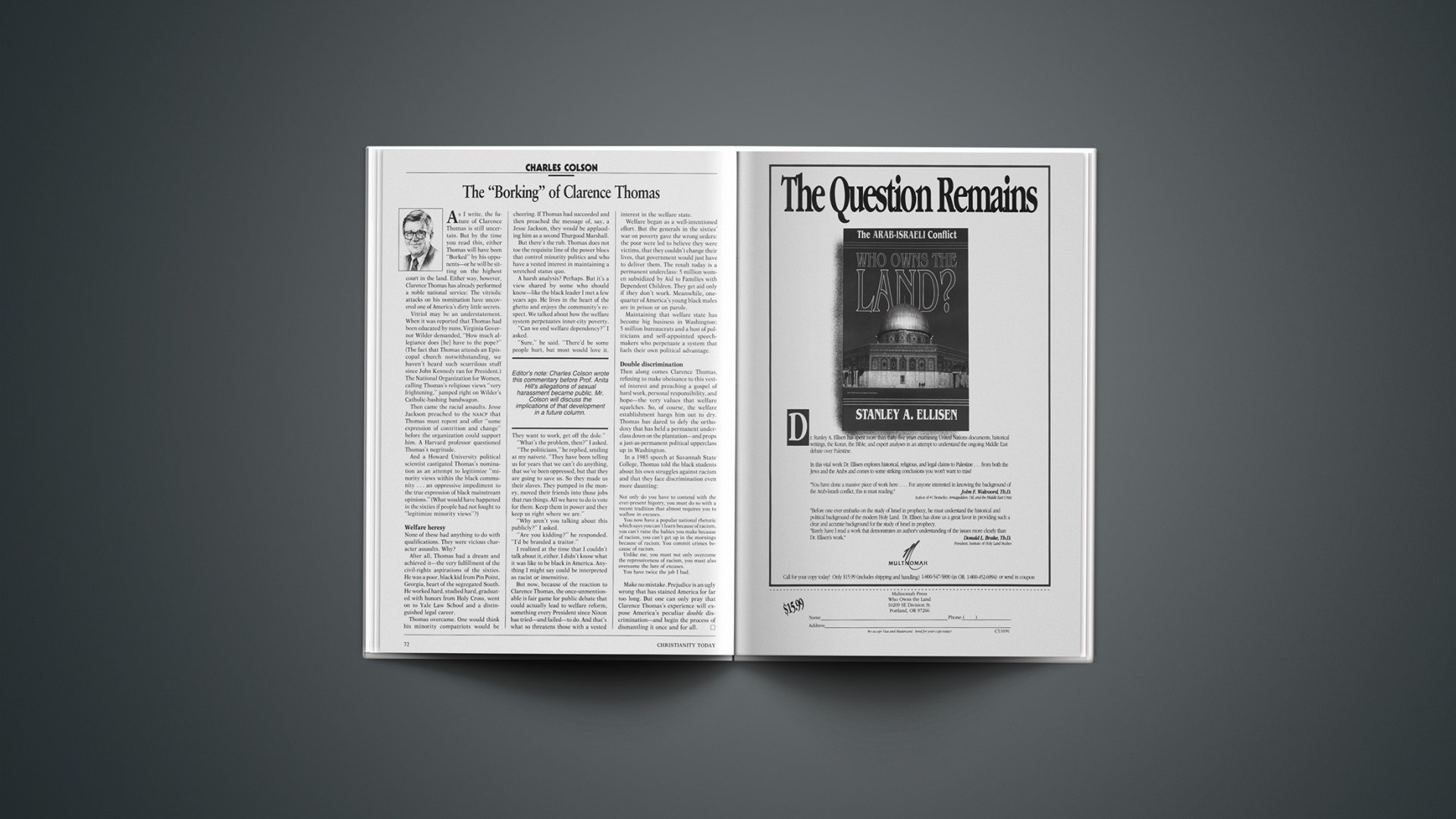Editor’s note: Charles Colson wrote this commentary before Prof. Anita Hill’s allegations of sexual harassment became public. Mr. Colson will discuss the implications of that development in a future column.
As I write, the future of Clarence Thomas is still uncertain. But by the time you read this, either Thomas will have been “Borked” by his opponents—or he will be sitting on the highest court in the land. Either way, however, Clarence Thomas has already performed a noble national service: The vitriolic attacks on his nomination have uncovered one of America’s dirty little secrets.
Vitriol may be an understatement. When it was reported that Thomas had been educated by nuns, Virginia Governor Wilder demanded, “How much allegiance does [he] have to the pope?” (The fact that Thomas attends an Episcopal church notwithstanding, we haven’t heard such scurrilous stuff since John Kennedy ran for President.) The National Organization for Women, calling Thomas’s religious views “very frightening,” jumped right on Wilder’s Catholic-bashing bandwagon.
Then came the racial assaults. Jesse Jackson preached to the NAACP that Thomas must repent and offer “some expression of contrition and change” before the organization could support him. A Harvard professor questioned Thomas’s negritude.
And a Howard University political scientist castigated Thomas’s nomination as an attempt to legitimize “minority views within the black community … an oppressive impediment to the true expression of black mainstream opinions.” (What would have happened in the sixties if people had not fought to “legitimize minority views”?)
Welfare Heresy
None of these had anything to do with qualifications. They were vicious character assaults. Why?
After all, Thomas had a dream and achieved it—the very fulfillment of the civil-rights aspirations of the sixties. He was a poor, black kid from Pin Point, Georgia, heart of the segregated South. He worked hard, studied hard, graduated with honors from Holy Cross, went on to Yale Law School and a distinguished legal career.
Thomas overcame. One would think his minority compatriots would be cheering. If Thomas had succeeded and then preached the message of, say, a Jesse Jackson, they would be applauding him as a second Thurgood Marshall.
But there’s the rub. Thomas does not toe the requisite line of the power blocs that control minority politics and who have a vested interest in maintaining a wretched status quo.
A harsh analysis? Perhaps. But it’s a view shared by some who should know—like the black leader I met a few years ago. He lives in the heart of the ghetto and enjoys the community’s respect. We talked about how the welfare system perpetuates inner-city poverty.
“Can we end welfare dependency?” I asked.
“Sure,” he said. “There’d be some people hurt, but most would love it. They want to work, get off the dole.”
“What’s the problem, then?” I asked. “The politicians,” he replied, smiling at my naïveté. “They have been telling us for years that we can’t do anything, that we’ve been oppressed, but that they are going to save us. So they made us their slaves. They pumped in the money, moved their friends into those jobs that run things. All we have to do is vote for them. Keep them in power and they keep us right where we are.”
“Why aren’t you talking about this publicly?” I asked.
“Are you kidding?” he responded. “I’d be branded a traitor.”
I realized at the time that I couldn’t talk about it, either. I didn’t know what it was like to be black in America. Anything I might say could be interpreted as racist or insensitive.
But now, because of the reaction to Clarence Thomas, the once-unmentionable is fair game for public debate that could actually lead to welfare reform, something every President since Nixon has tried—and failed—to do. And that’s what so threatens those with a vested interest in the welfare state.
Welfare began as a well-intentioned effort. But the generals in the sixties’ war on poverty gave the wrong orders: the poor were led to believe they were victims, that they couldn’t change their lives, that government would just have to deliver them. The result today is a permanent underclass: 5 million women subsidized by Aid to Families with Dependent Children. They get aid only if they don’t work. Meanwhile, one-quarter of America’s young black males are in prison or on parole.
Maintaining that welfare state has become big business in Washington: 5 million bureaucrats and a host of politicians and self-appointed speech-makers who perpetuate a system that fuels their own political advantage.
Double Discrimination
Then along comes Clarence Thomas, refusing to make obeisance to this vested interest and preaching a gospel of hard work, personal responsibility, and hope—the very values that welfare squelches. So, of course, the welfare establishment hangs him out to dry. Thomas has dared to defy the orthodoxy that has held a permanent underclass down on the plantation—and props a just-as-permanent political upperclass up in Washington.
In a 1985 speech at Savannah State College, Thomas told the black students about his own struggles against racism and that they face discrimination even more daunting:
Not only do you have to contend with the ever-present bigotry, you must do so with a recent tradition that almost requires you to wallow in excuses.
You now have a popular national rhetoric which says you can’t learn because of racism, you can’t raise the babies you make because of racism, you can’t get up in the mornings because of racism. You commit crimes because of racism.
Unlike me, you must not only overcome the repressiveness of racism, you must also overcome the lure of excuses.
You have twice the job I had.
Make no mistake. Prejudice is an ugly wrong that has stained America for far too long. But one can only pray that Clarence Thomas’s experience will expose America’s peculiar double discrimination—and begin the process of dismantling it once and for all.










